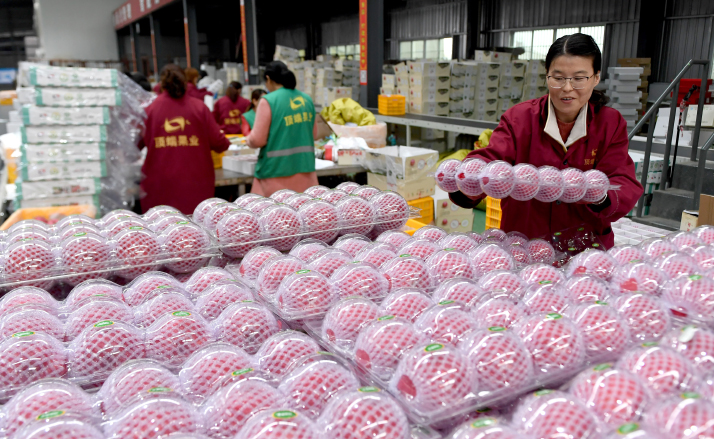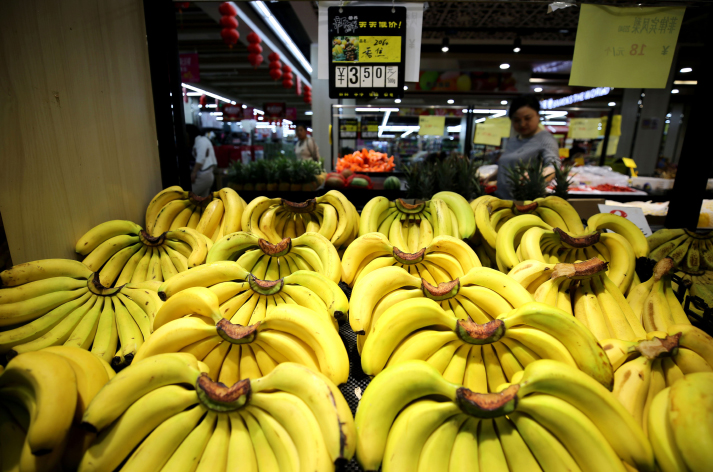| Business |
| The Apple of Discord | |
| Rising fruit prices upset buyers but increasing supplies may right the balance | |
|
|
 Workers package apples in a fruit processing company in Luochuan County, northwest China's Shaanxi Province, on April 28 (XINHUA)
In the sweltering heat and thirst of summer, people who sought to chill with the many seasonal fruits available have received another shock. The luscious varieties available on supermarket shelves no longer have the same beautiful prices seen last year. Feng Xiaoyu, a 28-year-old teacher in Beijing, has noticed the upward trajectory of fruit prices with dismay. A frequent buyer of assorted fruits from e-commerce platforms, she said, "These days, I can get fewer varieties for 50 yuan ($7.24) than I could before." In May, premium apples in a chain supermarket in Zibo, east China's Shandong Province, which earlier cost 12-14 yuan ($1.74-2) per kg, upped their prices by 30 to 40 percent, a staff said. According to market analysts, in recent years, the wholesale price of apples rose moderately at the beginning of each year, but in the third quarter, as large numbers of the fruit glutted the market, the price fell. However, the situation seems different this year with the price showing a hefty increase and hitting a record high. What's more, apples are not the only fruit to grow dearer.The overall prices of fruits have shown a rising trend after the Spring Festival, the Chinese Lunar New Year, in early February. In April, the consumer price index (CPI), a main gauge of inflation, registered a 2.5-percent growth year on year. Fruit prices increased by 11.9 percent, contributing 0.22 percent of that growth, according to the National Bureau of Statistics (NBS).  A supermarket in Yichun, east China's Jiangxi Province, on May 9 (XINHUA)
Behind the hike China Merchants Securities (CMS), a provider of securities services, said in a research report that the primary reason for the fruit price hikes is the imbalance between supply and demand. And supply and demand are affected by factors such as the weather, consumption upgrade, the macroeconomy and devaluation of the renminbi. Gao Feng, a spokesperson for the Ministry of Commerce (MOFCOM), also attributed the rising prices to tighter supplies and unfavorable weather conditions in major fruit-producing areas. "After the start of spring, major producing areas saw continuous rainy days with low and fluctuating temperatures in parts of north China, resulting in a negative impact on fruit and vegetable production," Gao told a press conference on May 30. Worse still, bad weather struck major fruit-producing areas, both in north and south China, last year. Shi Benpeng heads an apple production and sales cooperative in Xinzhuang, a village in Shandong. The cooperative grows the fruit in a 53-hectare orchard. "The production reduced by 30 percent in 2018. Normally, the yield per hectare is 36-57 tons but last year, it was 25-46 tons," Shi said, adding that it was the same scenario for all local planters. According to Shi, while some had their production reduced as they are trying to improve their fruit variety and the full fruit-bearing period is yet to come, the overall dip in production is attributed to the extreme weather last spring. "The cold air in April 2018 when the apple trees were blossoming lowered the fruit-bearing capacity. Later, extreme weather conditions such as hailstorms followed, reducing the output," he said. Mei Xinyu, a researcher with MOFCOM, told the media that the rising prices could also be related to changes in the sales scenario. In big cities, consumption and the way of packaging have changed. Costs are increasing as the packaging becomes more sophisticated and the operation more standardized. Also, farmers are selling their products both online and offline, which puts them in a better position to bargain for an improved price. Apple growing is a pillar industry in a village in Penglai, Shandong, where the farmers have established a cooperative to sell the fruit across multiple channels. Wang Hongfei, a village official, said e-commerce platforms, which provide a direct link between producers and consumers, are paying more attention to small villages. "In the past, agents who acted as an intermediary between farmers and buyers played a big role," Wang said. "But now farmers have a say in choosing where and how to sell." The CMS said people are upgrading their consumption and demanding better products. As a result, farmers are investing in better breeds to meet their need. They too are winners since with high-quality products they can get a good price. Subsequently, along the chain, wholesalers and retailers are also raising their prices accordingly to ensure profit. Some market analysts also cited the recent devaluation of the renminbi. Since the beginning of May, the Chinese currency weakened against the U.S. dollar from around 6.7 yuan per dollar to around 6.9 yuan. "In May, after the U.S. Government announced a tariff hike on $200 billion worth of Chinese imports, the renminbi devaluated by 3 percent," Li Xianglong, Vice Chairman of the China Center for International Economic Exchanges, told Economic Daily. "Obviously, the escalation in trade frictions affected the market." This affected the prices of imported fruits, though to a marginal degree. The good news As buyers fret whether the fruit price hikes will continue, NBS spokesperson Liu Aihua said on May 15 that while fruit and vegetable prices have risen mainly due to extreme weather, the seasonal impact will be short term. Prices will not stay high for long. Market analysts echoed Liu's views, saying eventually, the market will play its role and the rises will come to an end. Haitong Futures, a brokerage agency, said in the north, fruits stored last year are selling out while in the south, tropical fruits' output faces reduction. These factors together have led to the soaring prices. But in June fruits will arrive in the market in large quantities. Popular ones like the watermelon and peach are expected to see normal production, though the yield of tropical fruits such as the lychee, longan and mango is likely to be lower. On the other hand, the production of bananas and oranges is projected to increase. Overall, the supply of fruits will be sufficient this summer and prices will stabilize, according to Haitong Futures. Yang Jun, an agricultural analyst with Sublime China Information, an information provider for the Chinese commodity market, pointed out that fruits are highly substitutable in consumption. So it is difficult to sustain high prices. He suggested that farmers and dealers be rational about output reduction and not hoard their products because when other fruits like the watermelon come, prices would fall. It is risky to stock up too much in the hope of getting higher prices. Sinolink Securities, a brokerage service provider, estimated that the rising prices of fruits will contribute 0.2 percent of CPI growth month on month. As there is still room for pork prices to rise, the CPI rise in May is estimated to reach 2.9 percent year on year, the highest since November 2018. It said the CPI will face downward pressure from June although fruit prices will remain high till September. But fresh apples will hit the market in October, and that's a reason for optimism. Copyedited by Sudeshna Sarkar Comments to zhangshsh@bjreview.com |
|
||||||||||||||||||||||||||||
|
